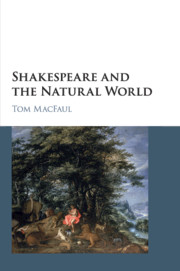Book contents
- Shakespeare and the Natural World
- Shakespeare and the Natural World
- Copyright page
- Dedication
- Contents
- Book part
- Introduction
- Chapter 1 Country matters
- Chapter 2 Man and other animals
- Chapter 3 Lawful as eating? Food, natural magic and the arts of health
- Chapter 4 The Tempest
- Bibliography
- Index
- References
Bibliography
Published online by Cambridge University Press: 05 November 2015
- Shakespeare and the Natural World
- Shakespeare and the Natural World
- Copyright page
- Dedication
- Contents
- Book part
- Introduction
- Chapter 1 Country matters
- Chapter 2 Man and other animals
- Chapter 3 Lawful as eating? Food, natural magic and the arts of health
- Chapter 4 The Tempest
- Bibliography
- Index
- References
- Type
- Chapter
- Information
- Shakespeare and the Natural World , pp. 195 - 204Publisher: Cambridge University PressPrint publication year: 2015



